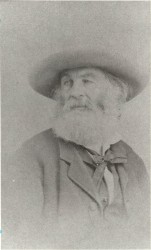I hear America singing, the varied carols I hear.

Walt Whitman Photo Courtesy of Walt Whitman House, Camden, NJ (Photographer Unknown, Matthew Brady?)
Born on May 31, 1819 in West Hills, New York, Walt Whitman changed the way we thought about poetry.
He “heard America singing.” And his work has inspired some, bedeviled others (mostly students) and stood as the work of a unique American voice for more than 150 years. In July 1855, a former schoolteacher turned newspaper publisher, Walt Whitman self-published 795 copies of the first edition of twelve of his poems in a book called Leaves of Grass. Over the years, Whitman (1819-1892) would add many more poems to later editions of the work that may be the most famous American book of poems ever published. Sample a bit of Whitman in this quick quiz. (Answers below)
1. Where did Whitman attend college?
2. How did Whitman serve during the Civil War?
3. What event inspired the poems “O Captain! My Captain!” and “When Lilacs Last in the Dooryard Bloom’d”?
4. Why did he lose his government job in 1865?
During the Civil War, Whitman recorded wartime life in Washington, D.C. and wrote of seeing Lincoln many mornings as he rode through the city surrounded by a cavalry guard, sabers drawn.
I see very plainly ABRAHAM LINCOLN’S dark brown face, with the deep-cut lines, the eyes always to me with a deep. latent sadness in the expression. We have got so that we exchange bows, and very cordial ones….None of the artists or pictures has caught the deep, though subtle and indirect expression of the man’s face. One of the great portrait painters of two or three centuries ago is needed.
The Walt Whitman Birthplace is a state historic site in West Hills.
The National Endowment for the Humanities Edsitement offers some very good resources of Whitman and the literature of the Civil War.
Another excellent resource is the Walt Whitman Archive at the University of Nebraska-Lincoln.
Answers
1. He didn’t. Born on Long Island, New York, he went to school for about six years before becoming a printer’s apprentice and was largely self-educated after that.
2. After his brother was wounded in battle, he became a volunteer nurse, aiding the sick in Washington, D.C. hospitals while working for the Army’s Paymaster’s office.
3. The death of Abraham Lincoln, whom Whitman greatly admired.
4. He was fired for his poems which the Secretary of the Interior found offensive, presumably for some of their homosexual themes.

Don't Know Much About History (Revised, Expanded and Updated Edition)

The paperback edition had been released with a new cover to mark the 150th anniversary of the Civil war.